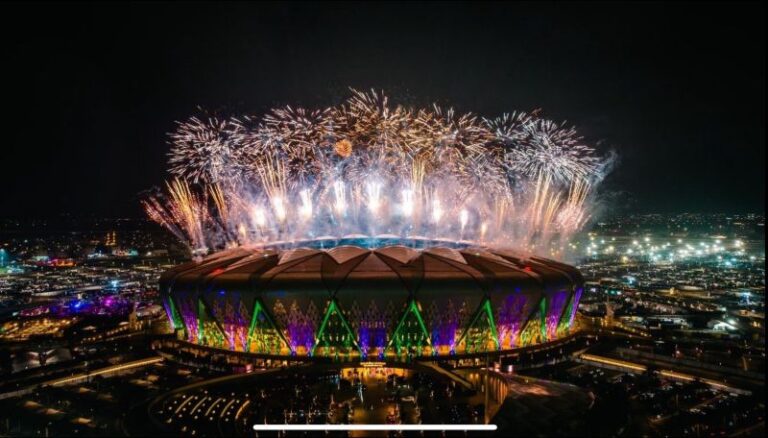A report from global consultancy Roland Berger has identified several transport-related challenges that Saudi Arabia must tackle ahead of hosting the 2034 FIFA World Cup.
On 11 December 2024, Saudi Arabia was formally confirmed as the host nation for the 2034 edition of one of the biggest football, and indeed sporting, competitions in the world – the World Cup.
The World Cup 2034 Hosting Higher Authority, which is overseeing the planning and delivery of the tournament, says that the tournament will be ‘supported and shaped by Saudi Arabia’s growing tourism industry, ensuring visitors will have an unforgettable experience’.
It claims that it want to ‘deliver a lasting legacy of positive change through responsible hosting, prioritising sustainability, and minimising environmental impact’.
Central to driving what the World Cup 2034 Hosting Higher Authority describes as ‘an ambitious vision’ is Saudi Vision 2030 – a roadmap to ‘diversifying the economy, empowering citizens, creating a vibrant environment for both local and international investors, and establishing Saudi Arabia as a global leader’.
READ MORE: DHL Group set to invest over £420m in Middle East operations by 2030
But according to a new report from Roland Berger, achieving these goals in time for the 2034 World Cup will not be without its challenges, especially where transport is concerned.
The authors of the report have identified five major challenges that need to be tackled to ensure seamless mobility for the duration of the tournament: scale, timing, coordination, diversity of user groups and sustainability.
The report acknowledges the ‘exceptional visitor volumes’ that the tournament will generate, with FIFA having recorded over one million international visitors for the last World Cup in Qatar and similar number expected to come to Saudi Arabia in 2034.
It also notes that the event being in 2034 gives Saudi Arabia nine years to prepare for the World Cup. In comparison, previous host countries have had up to 14 years to prepare.
In terms of coordination, linking transportation infrastructure around 15 stadiums spread across five host cities, the report says, ‘requires precise operational alignment’. Multiple organisations will need to ‘work in sync and establish clear protocols’.
Such organisations include the Ministry of Transport and Logistic Services (MoTLS), General Authority of Civil Aviation (GACA), Saudi Arabia Railways (SAR), World Cup Host Cities Authority (WCHA), and regional authorities such as the Royal Commission for Riyadh City and the Aseer Development Authority, plus developers including NEOM and the Qiddiya Investment Company (QIC).
Additionally, Roland Berger identifies the diverse nature of the groups that will be attending events as a challenge that the organisers will have to content with. Saudi Arabia will have to ensure the different mobility needs of local and international fans, as well as players, officials and journalists.
The final challenge that the report touches on is sustainability. As previously mentioned, minimising the environmental impact of the tournament is a top priority for the World Cup 2034 Hosting Higher Authority.
Roland Berger advises that Saudi Arabia take inspiration from the Paris 2024 Olympics, which aimed to cut its carbon footprint by 50-100% by using renewable energy and a fleet of electric and hydrogen-powered vehicles.
It says that ‘Saudi Arabia must implement similar solutions, aligned with its own net-zero emissions target by 2060 and commitments under the Saudi Green Initiative, while maintaining systems capacity to move millions of people efficiently’.
Alia Sabala, partner at Roland Berger, commented: “Delivering a seamless World Cup is about more than scale – it’s about smart, unified execution.”
FREE: Subscribe to Logistics Manager’s bi-weekly MEA newsletter!
Hosting an event as prestigious as the World Cup is a huge honour, but it also comes with a significant responsibility to deliver in terms of efficient transport and logistics, to ensure the tournament runs smoothly for all involved.
There will be two World Cup tournaments held before it is Saudi Arabia’s turn. The next World Cup will be held next year across the US, Canada and Mexico. In November 2024, FIFA announced that it had named event logistics company Rock-It Cargo as the Official Logistics Provider of the 2026 World Cup.
FIFA secretary general Mattias Grafström said at the time of the announcement: “In Rock-it Cargo we have found the perfect partner to entrust with the critical logistics services for the biggest FIFA World Cup ever.
“We’ve been impressed by Rock-it Cargo’s experience and attention to detail, teamwork and passion to deliver operational excellence. Their global model fits perfectly with our extensive ambitions for the tournament.”
Daniel Rosenthal, president and CEO of Global Critical Logistics – the parent company of Rock-it Cargo, added: “We are deeply honoured to have been selected by FIFA to support the planning and delivery of the biggest FIFA World Cup ever.
“For nearly 50 years our team has been trusted by the world’s biggest artists and North American sports leagues to deliver extraordinary experiences through extensive planning, contingency management and outstanding event coordination.
“We look forward to drawing on our experience in the FIFA World Cup 26 stadiums and host cities to help successfully execute the 39-day tournament.”
To give some context as to the scale of logistics operations required for a World Cup, reports claim that at the 2014 World Cup in Brazil, 3.1 million food and beverage transactions were completed in stadiums throughout the tournament.







